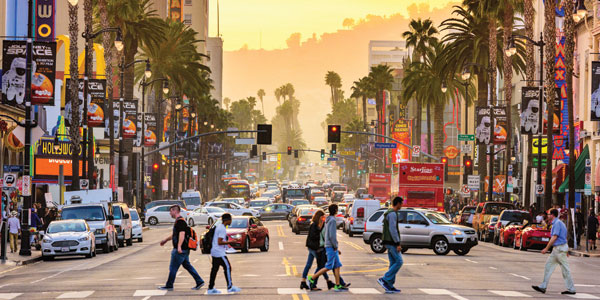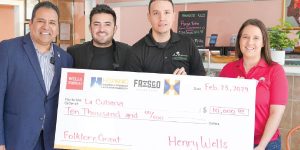
I recently went to Los Angeles for two days, and spent one looking back, the other looking forward.
LA is the city that saved me. Thirty-five years ago, it was where I settled after leaving Mexico, and the city embraced and welcomed me. Back then, America’s Latino wave was still in its infancy, but it was already clear that nothing could slow the growth of its Hispanic community.
One of the first things that amazed me about the United States was the fact that Americans were free to criticize the president and other leaders without fear of reprisal. By contrast, Mexican presidents — all hand-picked by their Institutional Revolutionary Party predecessors since 1929, in order to maintain a corrupt, repressive status quo — were untouchable. I had just turned 24 and hadn’t wanted to work as a censored journalist in Mexico, so I left. (Mexico had to wait almost two decades before holding its first more or less free election, in 2000.)
I came to California to study, with little money and few possessions. Back then I could carry all my belongings around with me; a suitcase, a guitar and a portfolio. I had been accepted into an extension course at the UCLA, so I had to find a place to live. I got a room in a house for students that cost $5 a night, with a rickety bed and no access to a kitchen. Along with my housemates, who were from Ghana, Brazil, Iran, Pakistan and South Korea, I cooked pasta and rice inside a closet so the owner wouldn’t find out. That first year I ate way too much lettuce and bread, but I also learned a lot.
Though I barely spoke English, I was still warmly welcomed by the community. The university, Los Angeles and the United States, in that order, lent me a hand when I needed it most. And for that I’ll be forever grateful. People were so caring and understanding when I was a newly arrived immigrant that the least I can do is fight for the immigrants arriving after me. They should be treated exactly the same way.
On a recent cool and sunny morning, I went jogging around the UCLA campus. Nostalgia made me stop again and again. I recognized a part of myself around every corner and in the face of every student I encountered. I can’t go back in time to those early days, but they were without a doubt the most important of my life. President John F. Kennedy was right when he wrote that, “Little is more extraordinary than the decision to migrate.”
But that is the past. With regard to the future, I had the chance to be one of the moderators at a UCLA debate among the six main candidates running for governor of California. At a time when President Donald Trump’s anti-immigrant policies are affecting millions of families, the state of California has emerged as an impediment to racism and discrimination. And many California cities have become sanctuaries for undocumented immigrants, much to the annoyance of Washington. That protective and generous spirit is similar to what I found when I was a student here.
And where California goes, the rest of the country follows. No ethnic group is a majority here. There are more Latinos living in California than in any other state, as well as a higher proportion of Asian-Americans, except for in Hawaii. And in a multiethnic, multiracial and multicultural state like this, the only way to live harmoniously is to be tolerant, respectful and accepting of those who are different, or come from other places.
We need to learn from California’s example. The Census Bureau estimates that by 2044 no ethnic group will be a majority in the United States. Non-Hispanic whites will account for less than half of the population, and our identity will be mixed.
In the end, Trump’s efforts to reverse demographics and make America whiter and more European again are doomed to fail. The future is here, and you can see it in California.
This is what I was thinking about while listening to the six candidates. But at times my mind would wander, and I would again see myself in the lively eyes of a student in the audience. After all, some time ago I was just like them.
(Jorge Ramos, an Emmy Award-winning journalist, is a news anchor on Univision.)
Dos Días en Los Ángeles
Me pasé dos días en Los Ángeles; uno para recordar y otro para ver el futuro.
Los Ángeles es la ciudad que me salvó, la primera a la que llegué después de irme de México hace 35 años. La ola latina apenas se estaba formando, pero ya quedaba claro que sería imparable y que lo trastornaría todo. Esta fue la ciudad que me dio mi primer abrazo en Estados Unidos.
Una de las primeras cosas que me sorprendió es que en Estados Unidos se podía criticar al presidente y no pasaba nada. El contraste era brutal. En esa triste época, en México casi no se podía tocar al presidente, ni al dedazo, ni al sistema de corrupción y represión que se había instalado con el PRI desde 1929. Yo apenas había cumplido 24 años, y no quería ser un periodista censurado. Así que me fui. (Mi cálculo fue correcto; tendrían que pasar casi dos décadas para que hubiera las primeras elecciones más o menos libres en el 2000.)
Llegué a California como estudiante y con muy poco. Todo lo que tenía — una maleta, una guitarra y un portafolio — lo podía cargar con mis dos manos. Me aceptaron en un curso de extensión universitaria en la Universidad de California, Los Ángeles, y busqué un lugar donde dormir. Encontré una casa de estudiantes donde pagábamos $5 dólares diarios, con derecho a una cama con huecos pero no al uso de la cocina. Por eso, junto a mis compañeros de Ghana, Brasil, Irán, Paquistán y Corea del Sur, cocinábamos pasta y arroz metidos en el closet del cuarto para que no se diera cuenta el dueño. Fue un año de mucha lechuga y pan, y de mucho aprendizaje.
Apenas hablaba inglés, pero fui recibido con enorme generosidad. La universidad, Los Ángeles y Estados Unidos, en ese orden, me dieron la mano cuando más lo necesitaba. Y eso es imposible de olvidar. Lo agradeceré siempre. Fui tratado con tanto cariño y con tanta comprensión que lo menos que puedo hacer es luchar para que los inmigrantes que llegaron después de mí reciban el mismo trato.
Una mañana, soleada y fresca, salí a correr por los pasillos y calles de la universidad que en 1983 se convirtieron en mi nuevo mapa. La nostalgia me hizo parar una y otra vez. En cada esquina del campus, y en la cara de cada estudiante, encontraba una parte de mí. Si alguien me hubiera visto habría dicho que ese corredor con canas estaba medio perdido y a punto de llorar.
No puedo regresar a esos días, pero fueron, sin duda, los más importantes de mi vida. El presidente John F. Kennedy tenía razón: “No hay nada más extraordinario que la decisión de emigrar”.
Bueno, dejemos el pasado atrás para echarle un vistazo al futuro.
Ahí, en la misma universidad, me tocó ser uno de los moderadores de un debate entre los seis principales candidatos a la gubernatura de California. En un momento en que las políticas antiinmigrantes del presidente Donald Trump están afectando millones de familias, California ha surgido como el antídoto al racismo y la discriminación. Enfureciendo al gobierno de Washington, varias ciudades californianas se han convertido en santuario para indocumentados. Ese espíritu, generoso y protector, es el mismo que yo conocí en mi época de estudiante.
Y para donde vaya California va el resto del país. Aquí ningún grupo étnico es mayoría. Hay más hispanos que en cualquier otro estado del país y también más asiáticos, con la excepción de Hawái. Y en un estado multiétnico, multirracial y multicultural como California, la única manera de vivir civilizadamente es con mucha tolerancia, respeto y aceptación de los que son distintos y vienen de fuera.
Más vale que aprendamos de California. La Oficina del Censo calcula que para el 2044 ningún grupo étnico será mayoría en Estados Unidos. Los blancos no hispanos serán menos de la mitad y nuestra identidad estará compuesta por mezclas.
Conclusión: El esfuerzo trumpista de revertir el cambio demográfico, y de volver a hacer de Estados Unidos un país blanco y europeo, va a fracasar. El futuro ya empezó, y se puede ver en California.
En todo esto pensaba mientras escuchaba a los seis candidatos. Pero de vez en cuando la mente se me echaba a volar y me encontraba en los ojos inquietos de algún estudiante. Ese, sentado ahí, alguna vez fui yo.
(Jorge Ramos, periodista ganador del Emmy, es el principal director de noticias de Univision Network. Ramos, nacido en México, es autor de nueve libros de grandes ventas, el más reciente de los cuales es “A Country for All: An Immigrant Manifesto”.)









